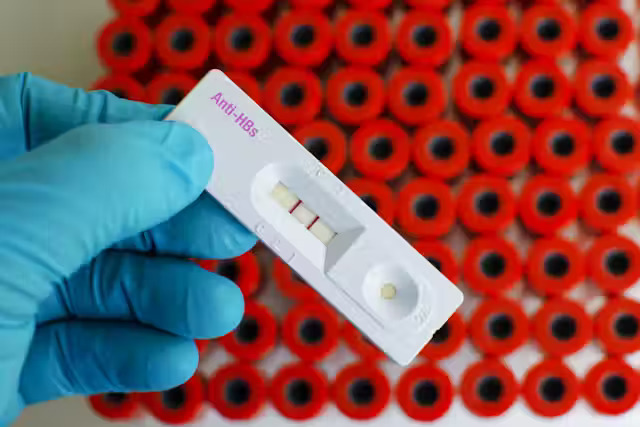Hepatitis is a disease of the liver that causes it to falter and is marked by swelling. It is caused by viruses known as hepatitis A, B, C, D, and E and also through excessive alcohol intake, toxins, harmful drugs or a reaction from the immune system.
The liver is a major life wire of the body, which cleans the blood, stores energy, retains energy and helps in food digestion. A dent on it can lead to advanced problems like liver damage, cancer, or even death if left untreated.
In Nigeria, the most common types are hepatitis B and C, which can be transmitted through infected blood, unsafe medical practices, or from a mother to her baby during childbirth.
According to the World Health Organisation (WHO), more than 350 million people around the world live with hepatitis B or C.
In Nigeria, hepatitis operates silently, claiming many lives. The World Health Organisation (WHO) estimates that more than 20 million Nigerians live with either hepatitis B or C, with many still oblivious of their status.
In response, the Nigerian Federal Government, alongside international and local bodies, has intensified its fight against the disease.
Project 365
Project 365 is the name given to the “end hepatitis” initiative, recently launched in partnership with the World Health Organisation on International Hepatitis Day, 28th July.
The programme, which is designed to run for one year, provides free daily hepatitis B and C screenings, vaccinations, awareness campaigns, and access to free treatment across all 36 states and the Federal Capital Territory (FCT).
Its primary aim includes reducing the high prevalence of undiagnosed hepatitis cases, eradicating ignorance and curbing mother-to-child transmission across the nation.
Since its launch, the initiative has successfully carried out hundreds of thousands of screenings and vaccinations nationwide, a significant step in closing the treatment gap and a major milestone in WHO’s 2030 elimination target
Beyond Project 365, other organisations and initiatives are also working behind the scenes to reduce the menace of hepatitis across Nigeria.
The Youth Health Action Network (YOHAN Africa)
This is one such organisation. It is a youth-centred initiative, which offers free screenings, vaccinations, counselling, and financial assistance to young people.
Enlightenment Initiative on Viral Hepatitis (EIVH)
Similarly, this organisation, founded by Nigerian scientists, coordinates quarterly screenings and awareness campaigns across all six geopolitical zones, ensuring that rural and underserved communities are not left out.
HealthForAll initiative
Here, they thread a unique path by advocating for free hepatitis testing for pregnant women with the aim of reducing mother-to-child transmission. It also organises large-scale awareness campaigns and events during World Hepatitis Testing Week.
Doxa Health Foundation
Popular for its community drive, this foundation provides free testing, vaccination, and treatment support. During a recent outreach at Abuja’s Mogadishu Cantonment, more than 1,110 residents benefited directly from the foundation’s generous services in just one day.
Centre for Initiative and Development (CFID)
This Taraba-based initiative has contributed immensely by testing over 165,000 Nigerians across 12 states under its 2024 Hepatitis Intervention Program. Impressively, CFID recorded a 100% sustained virologic response (SVR) in patients treated for hepatitis C.
These organisations complement the work of Project 365 by reaching various groups – youths, pregnant women, rural populations, and urban dwellers – ensuring that no segment of society is neglected in the fight against hepatitis.
The urgency of this intervention cannot be overemphasised. Hepatitis is not only a health crisis but also an economic threat; Nigeria loses 13.3 – 17.9 trillion naira yearly on the disease.
By prioritising testing, vaccination, and immediate treatment, Nigeria can save thousands of lives annually while simultaneously protecting its economic future.
Hepatitis is a liver disease caused by viruses (A, B, C, D, E), excessive alcohol use, toxins, harmful drugs, or an immune response. This disease impacts the liver's essential functions, and if untreated, can lead to serious conditions like liver damage or cancer. In Nigeria, hepatitis B and C are prevalent, often transmitted through infected blood, unsafe medical practices, or from mother to child during childbirth. Over 20 million Nigerians are estimated to be living with hepatitis B or C, contributing to a significant health crisis.
In response to this, Nigeria's Federal Government, supported by international organizations like WHO, has launched various initiatives such as Project 365. Initiated on July 28, 2025, Project 365 aims to combat the high rate of undiagnosed hepatitis cases with free screenings, vaccinations, and treatment across Nigeria. Complementary efforts by organizations like the Youth Health Action Network, Enlightenment Initiative on Viral Hepatitis, HealthForAll initiative, Doxa Health Foundation, and the Centre for Initiative and Development are targeting specific demographics including youths, pregnant women, and rural communities.
The fight against hepatitis in Nigeria is crucial not only for public health but also economically, as the nation loses an estimated 13.3 - 17.9 trillion naira annually due to the disease. By enhancing awareness and access to testing, vaccination, and treatment, these initiatives aim to save lives and safeguard Nigeria's economic future amidst the global goal to eliminate hepatitis by 2030.






